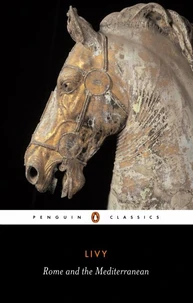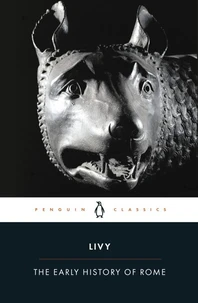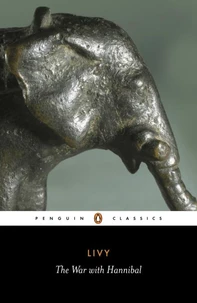Roman History, Books I - III. The Legendary Beginnings and Early Republic of Rome: Captivating Historical Narratives from Livy
Par : , , , ,Formats :
Disponible dans votre compte client Decitre ou Furet du Nord dès validation de votre commande. Le format ePub est :
- Compatible avec une lecture sur My Vivlio (smartphone, tablette, ordinateur)
- Compatible avec une lecture sur liseuses Vivlio
- Pour les liseuses autres que Vivlio, vous devez utiliser le logiciel Adobe Digital Edition. Non compatible avec la lecture sur les liseuses Kindle, Remarkable et Sony
 , qui est-ce ?
, qui est-ce ?Notre partenaire de plateforme de lecture numérique où vous retrouverez l'ensemble de vos ebooks gratuitement
Pour en savoir plus sur nos ebooks, consultez notre aide en ligne ici
- Nombre de pages306
- FormatePub
- ISBN4057664138552
- EAN4057664138552
- Date de parution20/11/2019
- Protection num.Digital Watermarking
- Taille806 Ko
- Infos supplémentairesepub
- ÉditeurGOOD PRESS
Résumé
In 'Roman History, Books I-III, ' Livy embarks on a monumental narrative that chronicles the foundational events of Rome, from its mythical origins to its ascent as a burgeoning republic. Written in a rich and eloquent Latin prose, Livy's style combines historical rigor with a poignant, almost poetic sensibility, illustrating not only the facts of Rome's past but also the moral and ethical lessons inherent in them.
Set against the backdrop of the late Roman Republic, a period rife with political turmoil, Livy's work serves as both a record and a reflection on the values of Roman society, emphasizing themes of virtue, duty, and the consequences of moral decay. Livy, full name Titus Livius, was born in 59 BCE in Patavium (modern-day Padua) and lived through momentous transitions in Roman history. His historical writing careers spanned the shift from the Republic to the Empire, providing him with a unique vantage point from which to contemplate the Roman character.
Livy was influenced by earlier historians and his commitment to preserving the memory of Rome's grandeur allowed him to create a narrative that is as much philosophical as it is historical, seeking to instruct future generations about the nature of power and civic responsibility. Readers of 'Roman History, Books I-III' are invited to delve into an enriched understanding of Rome's early narrative, crafted by a masterful historian whose insights resonate even today.
Livy'Äôs exploration of events like the founding of the city, the struggle for independence, and the moral fabric of its leaders makes this work essential for anyone invested in history, politics, or the very essence of human endeavor. This book not only lays the foundations for the understanding of Roman heritage but also encourages reflection on the societal values that shape civilizations.
Set against the backdrop of the late Roman Republic, a period rife with political turmoil, Livy's work serves as both a record and a reflection on the values of Roman society, emphasizing themes of virtue, duty, and the consequences of moral decay. Livy, full name Titus Livius, was born in 59 BCE in Patavium (modern-day Padua) and lived through momentous transitions in Roman history. His historical writing careers spanned the shift from the Republic to the Empire, providing him with a unique vantage point from which to contemplate the Roman character.
Livy was influenced by earlier historians and his commitment to preserving the memory of Rome's grandeur allowed him to create a narrative that is as much philosophical as it is historical, seeking to instruct future generations about the nature of power and civic responsibility. Readers of 'Roman History, Books I-III' are invited to delve into an enriched understanding of Rome's early narrative, crafted by a masterful historian whose insights resonate even today.
Livy'Äôs exploration of events like the founding of the city, the struggle for independence, and the moral fabric of its leaders makes this work essential for anyone invested in history, politics, or the very essence of human endeavor. This book not only lays the foundations for the understanding of Roman heritage but also encourages reflection on the societal values that shape civilizations.
In 'Roman History, Books I-III, ' Livy embarks on a monumental narrative that chronicles the foundational events of Rome, from its mythical origins to its ascent as a burgeoning republic. Written in a rich and eloquent Latin prose, Livy's style combines historical rigor with a poignant, almost poetic sensibility, illustrating not only the facts of Rome's past but also the moral and ethical lessons inherent in them.
Set against the backdrop of the late Roman Republic, a period rife with political turmoil, Livy's work serves as both a record and a reflection on the values of Roman society, emphasizing themes of virtue, duty, and the consequences of moral decay. Livy, full name Titus Livius, was born in 59 BCE in Patavium (modern-day Padua) and lived through momentous transitions in Roman history. His historical writing careers spanned the shift from the Republic to the Empire, providing him with a unique vantage point from which to contemplate the Roman character.
Livy was influenced by earlier historians and his commitment to preserving the memory of Rome's grandeur allowed him to create a narrative that is as much philosophical as it is historical, seeking to instruct future generations about the nature of power and civic responsibility. Readers of 'Roman History, Books I-III' are invited to delve into an enriched understanding of Rome's early narrative, crafted by a masterful historian whose insights resonate even today.
Livy'Äôs exploration of events like the founding of the city, the struggle for independence, and the moral fabric of its leaders makes this work essential for anyone invested in history, politics, or the very essence of human endeavor. This book not only lays the foundations for the understanding of Roman heritage but also encourages reflection on the societal values that shape civilizations.
Set against the backdrop of the late Roman Republic, a period rife with political turmoil, Livy's work serves as both a record and a reflection on the values of Roman society, emphasizing themes of virtue, duty, and the consequences of moral decay. Livy, full name Titus Livius, was born in 59 BCE in Patavium (modern-day Padua) and lived through momentous transitions in Roman history. His historical writing careers spanned the shift from the Republic to the Empire, providing him with a unique vantage point from which to contemplate the Roman character.
Livy was influenced by earlier historians and his commitment to preserving the memory of Rome's grandeur allowed him to create a narrative that is as much philosophical as it is historical, seeking to instruct future generations about the nature of power and civic responsibility. Readers of 'Roman History, Books I-III' are invited to delve into an enriched understanding of Rome's early narrative, crafted by a masterful historian whose insights resonate even today.
Livy'Äôs exploration of events like the founding of the city, the struggle for independence, and the moral fabric of its leaders makes this work essential for anyone invested in history, politics, or the very essence of human endeavor. This book not only lays the foundations for the understanding of Roman heritage but also encourages reflection on the societal values that shape civilizations.










